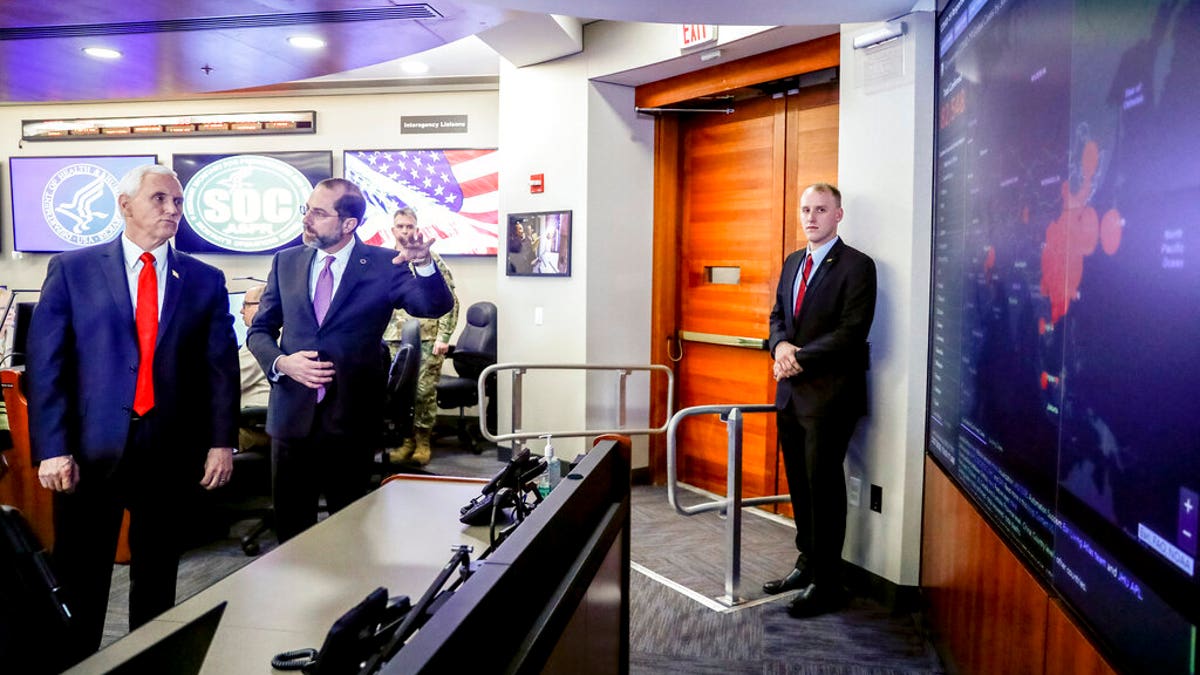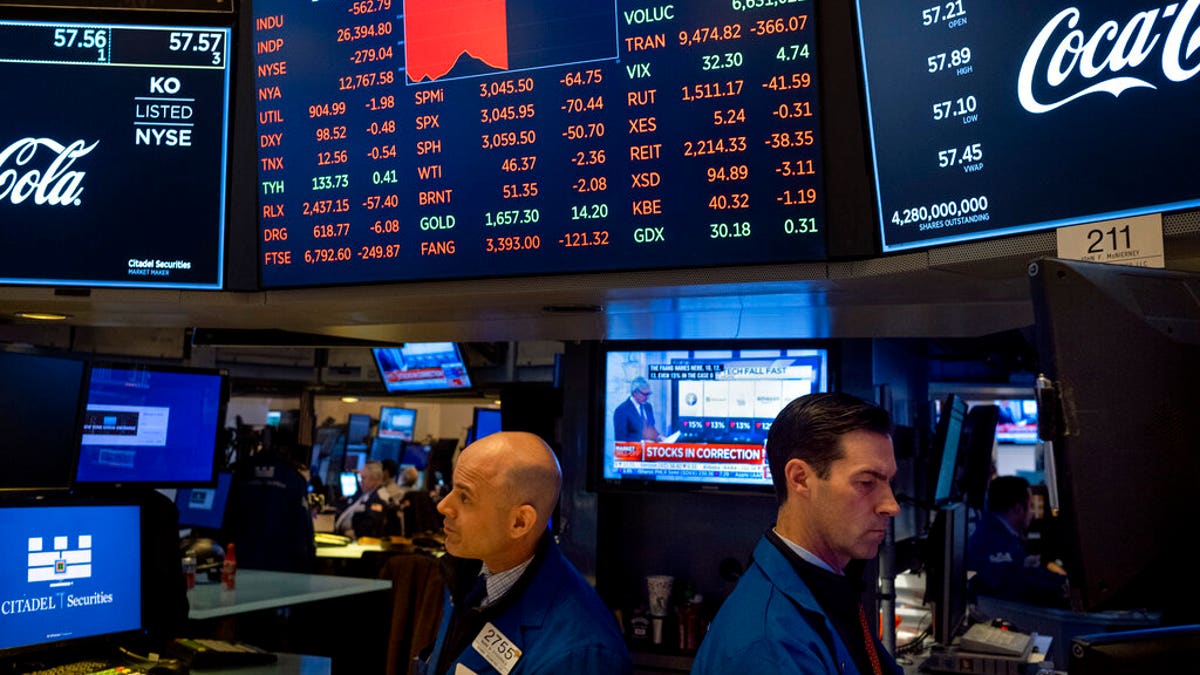CDC investigating California coronavirus case as first possible instance of ‘community spread’ in US
Chief Mississippi state health officer and infectious disease expert Dr. Thomas Dobbs weighs in on the coronavirus outbreak on ‘Outnumbered Overtime.’
The Department of Health and Human Services “improperly deployed” more than a dozen workers to two California military bases receiving Americans evacuated from coronavirus without giving them training or protective gear for handling the possibly high-risk patients, according to a new whistleblower complaint.
The whistleblower alleged that HHS officials shot down her concerns and on Feb. 15 threatened to fire her if she did not accept a reassignment. The workers who may have been exposed to the coronavirus then were able to travel freely among the public, the complaint reportedly said.
"We are hopeful that Congress and the OSC [the U.S. Office of the Special Counsel] will investigate this case in a timely and comprehensive manner," the whistleblower's attorney, Lauren Naylor, told Fox News, adding that the team could not provide a public copy of the complaint. "This matter concerns HHS’s response to the coronavirus, and its failure to protect its employees and potentially the public. The retaliatory efforts to intimidate and silence our client must be opposed."
The New York Times and The Washington Post first reported the story. Zachary Kurz, the communications director for the U.S. Office of the Special Counsel, confirmed to Fox News that the Office of Special Counsel has received the HHS whistleblower’s complaint and the case has been assigned.
CLICK HERE FOR THE LATEST ON CORONAVIRUS

Eric Vita, of Morris Plains, N.J., center, wears a protective mask while posing for a photograph with people dressed as "Crypto," the main character in the video game "Destroy All Humans!," Thursday, Feb. 27, 2020, at the Pax East conference, in Boston. Vita said concerns about the coronavirus played a role in his decision to wear a mask to the conference. (AP Photo/Steven Senne)
In a primetime press conference Wednesday, President Trump said a vaccine was coming along well, but officials later clarified it wouldn't be ready for approximately a year and a half. The president and his deputies emphasized that the risk to Americans was "low" but could potentially increase quickly. Vice President Mike Pence was appointed to oversee efforts to combat the virus.
Meanwhile, California and federal officials on Thursday were in the midst of an intense effort to retrace the movements of a Northern California woman believed to be the first person in the U.S. to contract the highly contagious coronavirus with no known connection to travel abroad or other known causes.
The woman lives in Solano County, home to Travis Air Force Base, where dozens of people infected in China or on cruise ships have been treated.
However, Sonia Angell, director of the California Department of Public Health, said there was no evidence the woman had any connection to the base.

Vice President Mike Pence, left, and Health and Human Services Secretary Alex Azar, second from left, look at a large monitor displaying a tally of total coronavirus cases, deaths, and recovered, as they tour the Secretary's Operations Center following a coronavirus task force meeting at the Department of Health and Human Services, Thursday, Feb. 27, 2020, in Washington. (AP Photo/Andrew Harnik)
Gov. Gavin Newsom declined comment when asked by reporters to name the community in Solano County the woman was from but urged people to take precautions while emphasizing that the risks to public health were low. He said there was no need to declare a public health emergency.
“Everybody in this country is rightfully anxious about this moment,” Newsom said. “I think they should know we are meeting this moment with the kind of urgency that is necessary and I don’t want to over extend the anxiety.”
Newsom said the state only has only received about 200 testing kits for the virus, an amount he called “simply inadequate.” But he said federal officials have promised him the state will get many more soon.
CDC DIRECTOR SAYS CORONAVIRUS THREAT IN US REMAINS LOW, BUT WARNS THERE WILL BE NEW CASES
California Health and Human Services Agency Director Mark Ghaly said health officials would change the way they test for the virus by “shifting from order and community containment to one where we acknowledge that community spread is possible.” He did not elaborate.

This undated photo provided by U.S. Centers for Disease Control and Prevention shows CDC’s laboratory test kit for the new coronavirus. (CDC via AP)
The woman from Solano County was transferred from the Vacaville hospital to UC Davis Medical Center on Feb. 19, but it took four days for the Centers for Disease Controls and Prevention to approve a request to test the patient for COVID-19, according to a memo posted to the hospital’s website from interm CEO Brad Simmons and David Lubarsky, vice chancellor of human health sciences.
The patient arrived on a ventilator and special protection orders were issued “because of an undiagnosed and suspected viral condition,” according to the memo.
The hospital asked the CDC to test for the coronavirus but testing was delayed until Sunday “since the patient did not fit the existing CDC criteria for COVID-19,” the memo said.
CORONAVIRUS INFECTS WOMAN IN JAPAN FOR SECOND TIME, A FIRST IN THE COUNTRY
"While this is considered a serious public health threat, the risk to Solano County residents and the general public is low at this time,” the county health department said.
UC Davis Medical Center, which has treated other coronavirus patients, has been taking infection prevention precautions since the patient arrived. Officials believe there was a small chance that others at the facility were exposed to the virus and they were asked to stay home and monitor their temperatures, the memo said.

Stocks reflect declines on monitors as people work on the floor of the New York Stock Exchange Thursday, Feb. 27, 2020. (AP Photo/Craig Ruttle)
All of the 59 other cases in the U.S. have been for people who had traveled abroad or had close contact with others who traveled. Health officials have been on high alert for so-called community spread.
Earlier U.S. cases included 14 in people who returned from outbreak areas in China or their spouses; three people who were evacuated from the central China city of Wuhan; and 42 American passengers on the Diamond Princess cruise ship who were evacuated by the federal government to the U.S. from where the ship was docked in Japan.
The global count of those sickened by the virus hovered Thursday around 82,000, with 433 new cases reported in China and another 505 in South Korea.
Although Trump has projected confidence that the stock market will hold in the long term, the Dow Jones Industrial Average tumbled nearly 1,200 points Thursday, deepening a weeklong worldwide rout caused by growing anxiety that the coronavirus will wreak havoc on the global economy. It was the market's worst one-day drop since 2011.
CLICK HERE TO GET THE FOX NEWS APP
The S&P 500 has now plunged 12 percent from the all-time high it set just a week ago. That puts the index in what market watchers call a “correction,” which some analysts have said was long overdue in this bull market, the longest in history.
Stocks are now headed for their worst week since October 2008, during the global financial crisis.
Fox News' Mike Emanuel and The Associated Press contributed to this report.














































